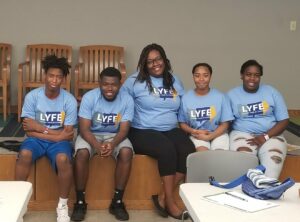Lea este blog en español AQUÍ
Lea este blog en español AQUÍ
The effects of the COVID-19 pandemic have been felt everywhere. It has changed the way sickle cell disease Warriors are able to get care in the clinical setting, but it has also brought opportunities to the SCD community. (For example, the number of outpatient telehealth visits rose sharply, making it easier for many to access select medical appointments from home.) However, overall the pandemic has placed extra stress on individuals; in addition to affecting physical health care, COVID-19 has impacted the mental health of adults in the U.S. and around the world. Researchers have found that rates of depression among adults are at least three times higher than rates before the pandemic.
 Sick Cells spoke with Whitney Carter, a SCD Warrior, about her mental health journey over the course of the pandemic. Whitney has sickle cell Hgb SS, lives in Louisiana with her husband and three children, and leads a very busy life between work, family, and advocacy. About ten years ago, Whitney lost her oldest sister to sickle cell. This loss has been the fire beneath her advocacy work, inspiring her to run a sickle cell social group, Red Stick Sickle Cell, and educate about sickle cell at every opportunity.
Sick Cells spoke with Whitney Carter, a SCD Warrior, about her mental health journey over the course of the pandemic. Whitney has sickle cell Hgb SS, lives in Louisiana with her husband and three children, and leads a very busy life between work, family, and advocacy. About ten years ago, Whitney lost her oldest sister to sickle cell. This loss has been the fire beneath her advocacy work, inspiring her to run a sickle cell social group, Red Stick Sickle Cell, and educate about sickle cell at every opportunity.
Whitney shared that her sickle cell does not result in many hospitalizations or transfusions and that she’s mostly able to manage her pain at home. For her, challenges related to the ongoing COVID-19 pandemic are related to mental health.
Whitney started a new job at the beginning of the pandemic and almost immediately started working from home. For the first part, she was also trying to manage her three children’s online schooling. Her husband, who works two jobs, is out of the house for 12 to 13 hours at a time, so Whitney dedicated herself to her family’s at-home needs.
“It was overwhelming for me,” said Whitney, and shared that everyone in the household seemed to be stretched thin. “I had not been a stay-at-home mom, but I definitely feel like one now.” Like many parents working at home during the pandemic, Whitney found it difficult to balance her demands from work, support her children’s education, and find time for herself. “You don’t realize all you do until you sit down and think about it,” she reflected.
As a SCD Warrior, stress is one of Whitney’s biggest triggers for a crisis. “Mentally, I’ve been struggling since the pandemic started. I’m not usually the one to be stressed out too much. I’m the strong one, I’m the comforter, I’m the compassionate one. I’m the one pushing everybody else, but the pandemic kind of gave me a nervous breakdown. I haven’t even really told my husband.”
She knew her stress had increased beyond any level she had known before, so she kept a close watch on how her body was feeling. “I really tried to manage my pain at home with meds, but my pain medication makes me really tired,” Whitney said. This, in turn, impacted her ability to work regular business hours. Even though she had accommodations through her job and tried to work with her employer to find a rhythm that worked for both of them, she ended up losing her job a few months into the pandemic, which added to the stress she was already feeling. “There was a moment where I didn’t think we were going to have anywhere to stay. I couldn’t feed my kids because I was so bummed out and stressed out…”
Amidst taking care of herself and running her family, Whitney shares that the pandemic has also impacted her marriage because she and her husband rarely get to spend a lot of time together. “We’re five years into the marriage, but it feels like we already have that 10-year, 15-year strain,” she shares. This might be the hardest part of her life to help refocus because the couple is torn between providing for the family and making time to see each other, an experience many partners — and even just friends — have struggled with over the past two years.

During times that are as stressful as these, Whitney feels very strongly about taking care of herself and making sure she still has some time alone and creative outlets. It’s been difficult to find the time since there is so much to take care of, but she says every little bit is worth it, “[even] if it’s just 10 minutes out of the day for just a breathing exercise, writing in my journal, or taking a nice, steamy shower.” Occasionally, she is able to treat herself to something truly special, like the two-hour massage she booked for herself on her birthday. “I don’t want to act like I’m not anyone’s mother, anyone’s wife, or anyone’s friend, but I also need to make sure I’m me, just for myself.”
For others struggling to find a balance and help work on their mental health, Whitney says, “just get out into an open space: a park, a lake, whatever. It gives you a chance to just breathe, look up at the sky. This honestly helps you collect thoughts and ideas, think about things that have been on your mind, and release them. It’s a moment to yourself so you can just feel free.”
February 2022
Resources for mental health support:
